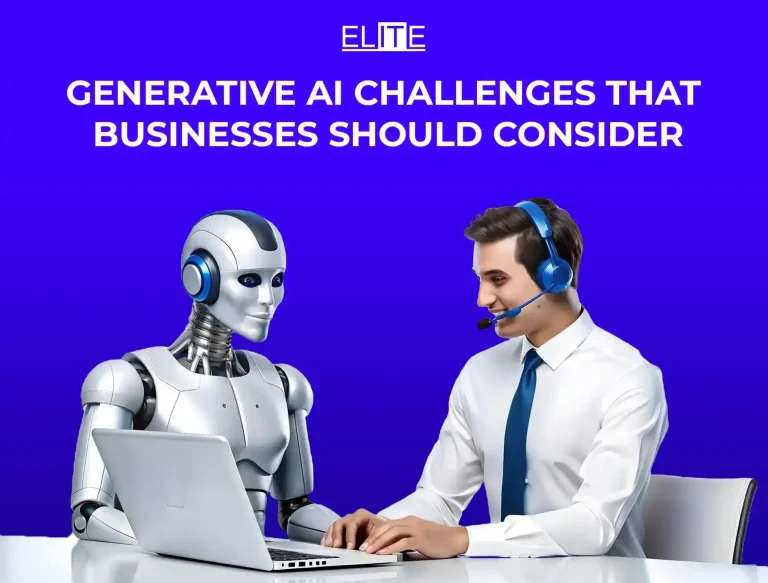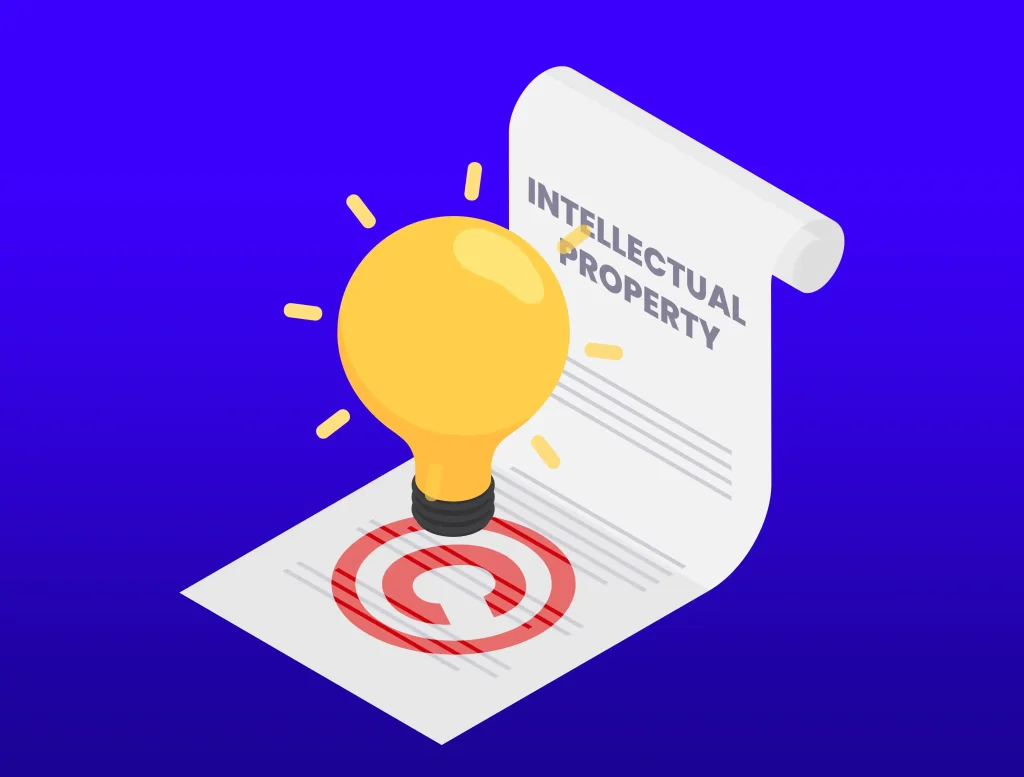Generative AI Challenges That Businesses Should Consider in 2024

Ever wonder if AI can really understand creativity? Well, with generative AI, we’re getting closer than ever! But like anything shiny and new, there are generative AI challenges that businesses should consider. So, what is generative AI exactly? In a nutshell, it’s the type of artificial intelligence that can create—whether it’s writing articles, generating images, or even composing music! Sounds amazing, right? But here’s where things get tricky, and where companies like Elite IT Team step in. Want to seamlessly integrate advanced generative AI technology into your business? Elite IT Team is your go-to.
Generative AI can do some pretty mind-blowing things. From crafting personalised marketing campaigns to automating content creation, the possibilities are endless! But it’s not just a walk in the park. While this technology can transform how businesses operate, it also comes with a few speed bumps. Think data privacy concerns, potential biases, and a need for human oversight. If you’re thinking about using these AI superpowers, Elite IT Team offers top-notch AI services to make your transition smooth and effective.
In this blog, we’re going to break down the key generative AI challenges that businesses should consider in 2024 and how to tackle them. Ready to dive in? Let’s get started!
9 Key Generative AI Challenges That Businesses Should Consider Today:
Generative AI is transforming industries like manufacturing, automotive, aerospace, and defence by optimising designs for performance, materials, and manufacturing methods. For instance, automakers use generative design to create lighter and more efficient vehicle parts. However, alongside these exciting advancements come several generative AI challenges that businesses should consider. By integrating AI for business automation, companies can streamline processes while addressing these challenges, ensuring smoother adoption of generative AI. These challenges need careful attention to ensure businesses can fully unlock the potential of generative AI without hitting major roadblocks. Let’s have a look at them!
Data Privacy and Security Risks in Generative AI:
Handling data securely is critical when using generative AI, especially since these systems rely heavily on massive datasets to generate content or designs. Mishandling sensitive information can lead to significant privacy breaches, leaving businesses exposed to legal, financial, and reputational damage. As companies adopt AI technologies, addressing generative AI risks in business is essential to ensure that data privacy and security measures are robust.
A notable example is Microsoft’s AI research team, which accidentally exposed 38 terabytes of private data while publishing open-source training data on GitHub. This leak included sensitive information such as private keys, passwords, and even over 30,000 internal Microsoft Teams messages. The incident highlights how easily security risks can arise in AI-driven projects and the need for strict protocols to avoid such costly mistakes.
Data Bias in Generative AI:
Human bias can sneak into AI-generated content, leading to unfair outcomes that perpetuate stereotypes. This happens because AI models are trained on historical data, which might reflect existing biases. AI for customer experience must be carefully designed to avoid such biases, ensuring fair and inclusive interactions. For example, if an AI writing tool is primarily trained on male-authored content, it might produce biassed language that reinforces gender norms, affecting how we perceive different roles in society. This is one of the key challenges faced in generative AI, as biassed models can influence decisions in a way that isn’t fair or balanced, creating long-term issues for businesses.
Take gender bias as an example. If an AI model is trained on a dataset where male doctors and female nurses are the norm, it will struggle to identify gender-neutral terms for professionals, reinforcing outdated stereotypes. This highlights the importance of using ethical AI applications in business to avoid perpetuating biases in everyday decisions, from hiring processes to customer service interactions. Addressing bias is key to making AI fair and inclusive for all.
Generative AI Interpretability and Explainability:
One major question businesses need to ask is, what challenges does generative AI face when it comes to transparency? Unlike traditional algorithms, generative AI models are often complex and function like black boxes, making it difficult to understand how they reach specific decisions. This lack of interpretability can be problematic, especially in industries like healthcare or finance, where trust and accountability are crucial. If a model can’t explain its reasoning, businesses may struggle to justify using it for high-stakes decisions.
For example, imagine an AI tool is used to approve or deny loan applications. If the system denies an application but can’t explain why, it raises concerns about fairness and trust. This challenge makes it vital for businesses to prioritise explainability in AI models. As we look toward the future of AI, improving this will be critical to ensuring that generative AI systems are both useful and reliable for businesses across various sectors.
Ensuring Generative AI Scalability And Adaptability:
One of the biggest artificial intelligence challenges businesses face is ensuring that generative AI systems can scale effectively. As a business grows, its AI models need to handle increasing volumes of data and more complex tasks. However, scaling these systems isn’t always straightforward. AI requires significant computational power and data management, and without the right infrastructure, it can be difficult for companies to keep up with the demand.
For example, in the e-commerce industry, an AI-driven recommendation system that works well for 1,000 users may struggle to maintain accuracy when scaled to millions of users. To address this, businesses need to invest in scalable infrastructures that support growth. Looking at the benefits of emerging technologies, adaptable AI solutions are becoming essential for businesses that want to remain competitive and agile in the fast-evolving tech landscape.
Ethical Issues in AI Use:
There are growing ethical concerns in generative AI as this technology becomes more prevalent. One major issue is the creation of deep fakes, where AI generates highly convincing fake images or videos, potentially leading to misinformation and identity theft. Additionally, AI systems can be exploited in cyberattacks, where malicious actors use generative models to craft phishing emails or manipulate data. These risks highlight the need for ethical guidelines to prevent AI from being misused and causing harm.
Another critical issue is job displacement, as generative AI takes over tasks traditionally done by humans, leading to concerns about employment. This is particularly relevant in sectors like AI in retail, where automation may impact roles such as customer service or inventory management. Moreover, generative AI challenges that businesses should consider also include dealing with data bias, as discussed above. Companies must implement strategies to ensure their AI solutions operate responsibly and align with societal values to mitigate these ethical risks.
Technical Complexity of Generative AI:
The technical complexity of generative AI requires deep knowledge of algorithms, data structures, and model training. Understanding how these systems work is essential for developing effective AI applications, especially as they become more integrated into various industries. However, this complexity can lead to data privacy issues with AI, where misconfigurations or lack of oversight may expose sensitive information. Addressing these concerns is vital for building trust in AI technologies.
Moreover, navigating this intricate landscape also brings AI-driven risks that businesses need to manage. For instance, sophisticated algorithms can inadvertently produce harmful or biased content if not carefully monitored. As companies explore the pros of AI, they must invest in training and resources to tackle these technical challenges effectively.
Regulatory Compliance:
As generative AI continues to evolve, the importance of regulatory compliance becomes increasingly clear. Governments around the world are recognizing the risks of AI and are working to establish frameworks that ensure AI technologies are used responsibly. For example, the recent passage of the EU AI Act aims to create a comprehensive regulatory environment for AI, focusing on transparency, accountability, and risk management. This legislation underscores the need for businesses to stay informed and adapt their AI strategies to comply with new regulations.
Navigating these regulations presents several generative AI challenges that businesses should consider. Companies must ensure their AI systems meet compliance requirements while still delivering value and innovation. Failure to adhere to these regulations can result in hefty fines and reputational damage.
Computational Resources and Costs:
Implementing generative AI can be resource-intensive, requiring significant computational power to process large datasets and run complex algorithms. Businesses often need specialised hardware like GPUs or cloud services to handle these operations, which can quickly drive up costs. Scaling up AI solutions means balancing performance and expenses, as more advanced models consume more resources.
Additionally, ongoing maintenance of AI systems adds to the total cost. Regular updates, data storage, and fine-tuning models require constant investment. For small businesses, these costs of generative AI can be prohibitive without careful planning. It’s crucial to assess both initial setup costs and long-term sustainability before diving into AI adoption.
Intellectual Property and Copyright Concerns:
When using generative AI to create content, businesses face a growing challenge regarding intellectual property and copyright laws. Since AI-generated content often pulls from vast datasets, there’s a risk that some of the material may unintentionally infringe on copyrighted works. Without clear guidelines, businesses might unknowingly use or distribute content that belongs to others, leading to potential legal issues.
Additionally, determining ownership of AI-generated content can be complicated. Who owns the rights—the business, the AI developer, or the tool provider? This grey area creates confusion, especially when it comes to commercial use or licensing. Navigating these copyright concerns with generative AI requires businesses to stay informed on evolving legal frameworks and implement safeguards to avoid potential disputes.
Conclusion:
The rise of generative AI brings with it a host of generative AI challenges that businesses should consider. From data privacy and ethical issues to technical complexity and regulatory compliance, navigating this landscape requires a proactive approach. Businesses must be aware of the generative AI risks in business to leverage its potential effectively while ensuring that ethical standards and legal frameworks are upheld.
As you explore the transformative possibilities of generative AI, partnering with experts can make all the difference. At Elite IT Team, we specialise in helping businesses integrate advanced AI solutions while addressing these challenges head-on. Ready to take your AI strategy to the next level? Contact us today to learn how we can help you thrive in this exciting era of technology!
Table of Contents
Frequently Asked Questions:

Zara Finch
Zara, an experienced professional in the SEO industry for the past two years, is passionate about discussing technology, innovations, and the ever-evolving digital landscape. With a keen interest in exploring the latest trends and developments, she brings valuable insights and expertise to her work.









